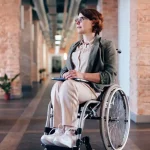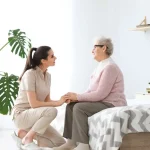Monitoring System for Seniors’
As a caregiver, you may be trying to help your loved one remain in their home and be independent. If that’s so, your job might be easier with a device that tracks and reports what he or she is doing.
A monitoring system for seniors can help. We’re not talking about “Big Brother” watching your loved one on camera 24 hours a day.
There are more subtle, dignified ways to be informed about your loved one’s safety. The use of the monitoring system must show respect for the user’s privacy and involve the caregiver when there is an emergency.
There is activity/movement tracking systems and devices available.
Before you decide, you should be informed about what these devices can and can’t do.
You should also discuss using a monitoring system for seniors with your family member. Look beyond the marketing materials and website deals to assess what you need and don’t need before you buy.
When Considering Home Monitoring, think about these questions:
- What medical condition does the resident have that might cause a need for monitoring? A seizure disorder, dementia, a mobility/movement disorder, blindness?
- What kinds of problems do I fear might happen? A fire in the kitchen? The loved one may forget to take medications? A cigarette igniting bedding? A fall in the shower? Will the device alert for this type of problem?
- What exactly is tracked and reported? All movements around certain high-traffic areas?
- Who gets the reports of the sensor system? What authorities should be alerted? Which adult in your family would want to be alerted?
- How quickly can it report?
- How much privacy must the resident give up? And how does that make the resident feel?
When you consider buying devices and connections, consider what technology you want:
- Is the system easy to set up in your living quarters? Or will it require a remodeling project?
- Will it add to your cable, phone, and electrical bills on a regular monthly basis? How much?
- What do the devices look like? Where will they be placed? Will some noises and lights annoy the patient?
- Will it work in weather emergencies, such as a power outage?
- Ask questions about a trial period before you commit to the full long-term purchase agreement.
Suppose there needs to be more cooperation with the system by the resident. In that case, the presence of a home tracking system may bring about intentional resistance and result in inefficient use of the system.
So it is important that the resident and the family feel comfortable with the system and what it does.
To find monitoring devices for a home, search for “home monitoring for patients” or “safety monitoring in homes” and read user reviews and the specifications for such devices.
Consider several manufacturers’ products when purchasing a home monitoring system for seniors’ sa
In Summary
Caring for your elderly loved one can be a difficult task. Home monitoring systems can help make it easier!
These systems provide peace of mind by tracking the activity and movements of your family member, without compromising their dignity or privacy.
Before buying a system, consider the medical needs of your loved one, as well as both their and your technology requirements.
Do your research beforehand to find the best product and manufacturer that meets your needs.
A home monitoring system can be an invaluable tool when providing distance care — so make sure you both feel comfortable with it!

